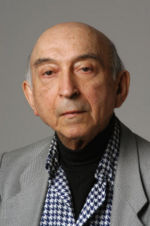扎德
出自 MBA智库百科(https://wiki.mbalib.com/)
目錄 |
拉特飛‧扎德(Lotfi A. Zadeh,1921~ )美國自動控制專家,美國工程科學院院士。1921年2月生於蘇聯巴庫。 1949年獲哥倫比亞大學電機工程博士。現任伯克利加利福尼亞大學電機工程與電腦科學系教授。因發展模糊集理論的先驅性工作而獲電氣與電子工程師學會(IEEE)的教育勛章。
扎德在控制理論方面有重要貢獻。
- 1949年他在關於時變網路頻率分析的博士論文中引入的時變變換函數的概念,後來成為線性時變系統分析的工具。
- 1953年他給出一種設計非線性濾波器的新的逼近方法。
- 1963年他和 C.A.德舍爾合著的《線性系統的狀態空間理論》是該領域的經典著作。書中介紹的狀態空間逼近已成為最優控制中的標準工具,廣泛用於工業機器人和社會經濟系統。
- 1965年,扎德在《信息與控制》雜誌第8期上發表《模糊集》的論文,引起了各國數學家和自動控制專家們的註意。他通過引進模糊集(邊界不明顯的類)提供了一種分析複雜系統的新方法。他提出用語言變數代替數值變數來描述系統的行為,使人們找到了一種處理不確定性的方法,並給出一種較好的人類推理模式。20年來他所開創的模糊集領域得到了迅速發展。
Lotfi A. Zadeh (b. 4 February 1921 in Baku, Azerbaijan) was educated in Iran and USA, having degrees from Tehran University, MIT, and Columbia University. Since 1959, Dr. Zadeh has been and currently is a member of the faculty of the Computer Science Division, Department of EECS, University of California at Berkeley. In addition, he is serving as the Director of BISC (Berkeley Initiative in Soft Computing). He held visiting appointments at the Institute for Advanced Study, Princeton, NJ; MIT, Cambridge, MA; IBM Research Laboratory, San Jose, CA; AI Center, SRI International, Menlo Park, CA; and the Center for the Study of Language and Information, Stanford University.
Lotfi Zadeh has received numerous awards, including the IEEE Medal of Honor, the IEEE Education Medal, the IEEE Richard W. Hamming Medal, the ACM Allen Newell Award, the Norbert Wiener Award of the IEEE Systems, Man and Cybernetics Society, the Honda Prize, the Okawa Prize, the Grigore Moisil Prize, the V. Kaufmann Prize, the B. Bolzano Medal of the Czech Academy of Sciences, the Nicolaus Copernicus Medal of the Polish Academy of Sciences, the Silicon Valley Engineering Hall of Fame and the Heinz Nixdorf MuseumsForum Wall of Fame. He is a recipient of twenty-six honorary doctorates, and is a member of the National Academy of Engineering. In addition, he is a foreign member of the Russian Academy of Natural Sciences, the Finnish Academy of Sciences, the Polish Academy of Sciences, the Korean Academy of Science & Technology and the Bulgarian Academy of Sciences.
Dr. Zadeh created a new field of mathematics - fuzzy set theory and fuzzy logic, which have found numerous applications ranging from consumer electronics to medicine and natural languages. His current research is focused on fuzzy logic, computing with words, and soft computing.








